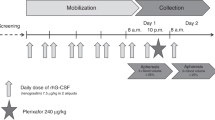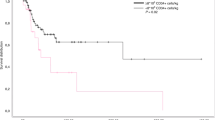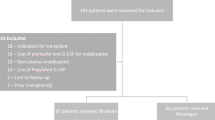Abstract
We have determined the effect of delayed addition of G-CSF after chemotherapy on PBPC mobilization in a group of 30 patients with high risk breast cancer (HRBC) undergoing standard chemotherapy followed by high-dose chemotherapy (HDCT) and autologous SCT. Patients received FAC chemotherapy every 21 days followed by G-CSF at doses of 5 μg/kg/day starting on day +15 (groups 1 and 2) or +8 (group 3) after chemotherapy. PBPC collections were performed daily starting after 4 doses of G-CSF and continued until more than 2.5 × 106 CD34+ cells had been collected. In group 1, steady-state BM progenitors were also harvested and used for SCT. Groups 2 and 3 received PBPC only. The median number of collections was three in each group. Significantly more PB CD34+ cells were collected in patients receiving G-CSF starting on day 8 vs day 15 (9.43 × 106/kg and 6.2 × 106/kg, respectively) (P < 0.05). After conditioning chemotherapy all harvested cells including BM and PBPC were reinfused. Neutrophil and platelet engraftment was significantly faster in patients transplanted with day 8 G-CSF-mobilized PBPC (P < 0.05) and was associated with lower transplant related morbidity as reflected by days of fever, antibiotics or hospitalization (P < 0.05). Both schedules of mobilization provided successful long-term engraftment with 1 year post-transplant counts above 80% of pretransplant values. In conclusion, we demonstrate that delayed addition of G-CSF results in successful mobilization and collection of PBPC with significant advantage of day 8 G-CSF vs day 15. PBPC collections can be scheduled on a fixed day instead of being guided by the PB counts which provides a practical advantage. Transplantation of such progenitors results in rapid short-term and long-term trilineage engraftment.
This is a preview of subscription content, access via your institution
Access options
Subscribe to this journal
Receive 12 print issues and online access
$259.00 per year
only $21.58 per issue
Buy this article
- Purchase on Springer Link
- Instant access to full article PDF
Prices may be subject to local taxes which are calculated during checkout
Similar content being viewed by others
Author information
Authors and Affiliations
Rights and permissions
About this article
Cite this article
Benet, I., Prosper, F., Marugan, I. et al. Mobilization of peripheral blood progenitor cells (PBPC) in patients undergoing chemotherapy followed by autologous peripheral blood stem cell transplant (SCT) for high risk breast cancer (HRBC). Bone Marrow Transplant 23, 1101–1107 (1999). https://doi.org/10.1038/sj.bmt.1701774
Received:
Accepted:
Published:
Issue Date:
DOI: https://doi.org/10.1038/sj.bmt.1701774
Keywords
This article is cited by
-
More efficient mobilisation of peripheral blood stem cells with HiDAC+AMSA+G-CSF than with mini-ICE+G-CSF in patients with AML
Bone Marrow Transplantation (2003)



